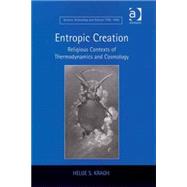Entropic Creation: Religious Contexts of Thermodynamics and Cosmology
, by Kragh,Helge S.- ISBN: 9780754664147 | 0754664147
- Cover: Hardcover
- Copyright: 5/28/2008
As economic, social and environmental connections among states have grown stronger and denser in the last decades, new levels and types of governance have emerged. The process of globalization, while not entirely new, has created new challenges for policymakers attempting to reap its benefits and manage its effects. This volume pulls together work on global governance that examines these challenges and looks at the patterns of governance that emerge. The work is organized into six sections. The first introduces concepts crucial to the analysis of global governance, including representation, efficiency, and hierarchy. The next two sections turn to specific patterns of governance in two realms, security and economic affairs respectively. The fourth section examines legal dimensions of governance. The fifth section concentrates on the impact of global governance on domestic politics, while the sixth looks at how concepts of norms and legitimacy structure our understanding of governance. Overall, this collection reveals a rich scholarly understanding of globalization, governance, and institutions that builds on deep theoretical roots while shedding light on major policy issues. Contents: Introduction; Part I Concepts: Governance in a partially globalized world, Robert O. Keohane; A pure theory of local expenditures, Charles M. Tiebout; Anarchy, hierarchy, and the variety of international relations, David A. Lake; Unravelling the central state, but how? Types of multi-level governance, Liesbet Hooghe and Gary Marks. Part II Governance of Security Issues: Preferential trading arrangements and military disputes, Edward D. Mansfield, Jon C. Pevehouse and David H. Bearce; The strategic use of internationalism: Libya and the UN sanctions, 19922003, Ian Hurd; Coercion through IOs: the Security Council and the logic of information transmission, Alexander Thompson. Part III Governance of Economic Issues: Setting international standards: technological rationality or primacy of power? Walter Mattli and Tim Buuml;the; The globalization of liberalization: policy diffusion in the international political economy, Beth A. Simmons and Zachary Elkins; Uneven patterns of governance: how developing countries are represented in the IMF, Ngaire Woods and Domenico Lombardi. Part IV Law and Global Governance: Regulating globalization? The reinvention of politics, David Held; Judicial lawmaking at the WTO: discursive, constitutional, and political restraints, Richard H. Steinberg; Is enforcement necessary for effectiveness? A model of the international criminal regime, Michael J. Gilligan; Filling in the gaps: extrasystemic mechanisms for addressing imbalances between the international legal operating system and the normative system, Charlotte Ku and Paul F. Diehl. Part V Global Governance and Domestic Politics: With a little help from my friends?: regional organizations and the consolidation of democracy, Jon C. Pevehouse; International actors on the domestic scene: membership conditionality and socialization by international institutions, Judith Kelley; Trading human rights: how preferential trade agreements influence government repression, Emilie M. Hafner-Burton. Part VI Norms and Legitimacy: Accountability and abuses of power in world politics, Ruth W. Grant and Robert O. Keohane; How ideas spread: whose norms matter? Norm localization and institutional change in Asian regionalism, Amitav Acharya; The political origins of the UN Security Council's ability to legitimize the use of force, Erik Voeten; 'Locating authority' in the global political economy, A. Claire Cutler; Index. About the Author: Lisa Martin is Professor of Government and a member of the Executive Committee of The Weatherhead Center for International Affairs at Harvard University, USA.







